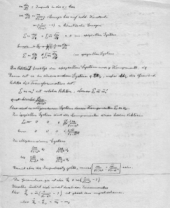 With a few exceptions, the material left at Einstein's
summer house in Caputh outside Berlin was destroyed in order
to prevent it falling into the hands of the Nazi authorities.
Einstein's Will of 1950 appointed his secretary, Helen Dukas,
and his close associate, Dr. Otto Nathan, as trustees of his estate.
Following Einstein's death in 1955, Dukas and Nathan devoted themselves tirelessly
for a quarter of a century to organizing the papers and
acquiring additional material.
As a result of their efforts,
the Archives grew threefold. In the 1960's, Helen Dukas and
Prof. Gerald Holton of Harvard University reorganized the material,
thereby rendering it accessible to scholars and preparing it
for eventual publication in The Collected Papers of Albert Einstein,
a joint project of The Hebrew University and Princeton University
Press. To facilitate editorial work, the papers were transferred
from Einstein's home to the Institute for Advanced Study in
Princeton. In 1982, the Einstein Estate transferred Einstein's personal papers
to the Jewish National & University Library in
Jerusalem. President Avraham Harman of The Hebrew University and
Prof. Milton Handler of the American Friends of The Hebrew
University played a crucial role in securing the transfer of the
material to Jerusalem. In subsequent years, additional material
was dispatched from Einstein's Princeton residence, namely his personal
collections of reprints, photographs, medals, and diplomas as well
as his private library. In 1988, the Bern Dibner Curatorship for
the running of the Albert Einstein Archives was established by the
Dibner Fund of Connecticut, USA.
With a few exceptions, the material left at Einstein's
summer house in Caputh outside Berlin was destroyed in order
to prevent it falling into the hands of the Nazi authorities.
Einstein's Will of 1950 appointed his secretary, Helen Dukas,
and his close associate, Dr. Otto Nathan, as trustees of his estate.
Following Einstein's death in 1955, Dukas and Nathan devoted themselves tirelessly
for a quarter of a century to organizing the papers and
acquiring additional material.
As a result of their efforts,
the Archives grew threefold. In the 1960's, Helen Dukas and
Prof. Gerald Holton of Harvard University reorganized the material,
thereby rendering it accessible to scholars and preparing it
for eventual publication in The Collected Papers of Albert Einstein,
a joint project of The Hebrew University and Princeton University
Press. To facilitate editorial work, the papers were transferred
from Einstein's home to the Institute for Advanced Study in
Princeton. In 1982, the Einstein Estate transferred Einstein's personal papers
to the Jewish National & University Library in
Jerusalem. President Avraham Harman of The Hebrew University and
Prof. Milton Handler of the American Friends of The Hebrew
University played a crucial role in securing the transfer of the
material to Jerusalem. In subsequent years, additional material
was dispatched from Einstein's Princeton residence, namely his personal
collections of reprints, photographs, medals, and diplomas as well
as his private library. In 1988, the Bern Dibner Curatorship for
the running of the Albert Einstein Archives was established by the
Dibner Fund of Connecticut, USA.
The Archives' first curator was Ze'ev Rosenkranz (1989-2003). His successor Dr. Roni Grosz heads the Archives since 2004. In January 2008, the Archives became part of the Hebrew University's Library Authority, and, in July 2008, moved to new premises in the Levi building on the Hebrew University's Edmond J. Safra campus, allowing for enhanced services to the public.